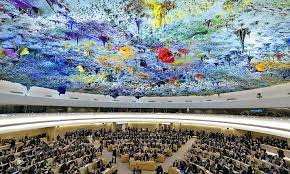Human Rights Council adopts 30 resolutions, two of them led by the European Union

Brussels: The 53rd session of the Human Rights Council took place in Geneva from 19 June to 14 July 2023. The EU successfully presented two resolutions, in addition to a dozen resolutions presented by EU Member States. The Council altogether adopted 30 resolutions at this session.
A few months ahead of the 75th anniversary of the Universal Declaration of Human Rights (10 December 2023), the EU stands united in support of the United Nations human rights system. Human rights remain a priority of our external action and we continue to raise our voice against human rights violations and abuses wherever they occur.
During the 53rd session of the Human Rights Council, the European Union presented a resolution on the human rights situation in Eritrea to draw attention to the very dire living conditions of the Eritrean population and renew the mandate of the UN Special Rapporteur for human rights in Eritrea. Grave human rights violations continue to take place in Eritrea, including enforced disappearance, torture, and prolonged arbitrary detention in inhuman conditions.
The EU also presented a resolution on the human rights situation in Belarus to renew the mandate of the Special Rapporteur on Belarus. All those arbitrarily detained should be immediately and unconditionally released. Given the scale and severity of the human rights violations committed in Belarus and the total lack of accountability, it is crucial that the Human Rights Council continues its scrutiny.
The EU also actively supported resolutions led by other States. We fully supported the resolution led by Ukraine on Cooperation with and Assistance to Ukraine in the field of Human Rights to strengthen the protection of human rights in the midst of Russia’s war of aggression. We discussed the High Commissioner’s report on Ukraine, which documents numerous cases of arbitrary detention, enforced disappearances, torture and executions committed by Russia. The numbers clearly underscore Russia’s blatant disregard for international human rights and humanitarian law.
We fully supported the resolution on the Human Rights Situation in the Syrian Arab Republic and its emphasis on the impact of the conflict on the situation of women and girls, as well as children in general. The dire human rights and humanitarian situation in Syria still calls for the full attention of the UN human rights bodies.
We welcomed the resolution on Civil Society Space in which the Council reaffirmed that creating and maintaining a safe and enabling environment, both online and offline, where civil society can operate free from hindrance and insecurity, helps states fulfill their international human rights obligations and commitments. The Council also urged states to ensure that legislation, policies and practices do not undermine the capacity of civil society to operate freely.
Child, early and forced marriage is a grave violation of human rights. We therefore strongly supported this resolution to end and prevent it. We also stand strong in our commitment to prevent and eliminate all forms of Violence against Women and Girl, which is why we also put our weight behind this resolution led by Canada, underlining the chosen theme of criminal justice detention as a valuable dimension to this issue.
We also lend full support for the resolution led by Argentina to advance the UN Guiding Principles on Business and Human Rights.
Moreover, the adverse impact of climate change on human rights has been a long-standing priority for us. The EU therefore joined consensus on the resolution Human Rights and Climate Change.
We fully supported the resolution that renewed the mandate of the Special Rapporteur on the Right to Education for a further period of three years.
The EU continues to stand firmly with Colombia to build lasting peace and uphold human rights. That is why we welcomed the resolution on the Enhancement of Technical Cooperation & Capacity-building in the field of Human Rights in Colombia.
The rapid development of digital technologies, which have a transformative impact on our economy and society, cannot be done at the expense of human rights. In that respect, we welcomed the adoption of the resolution on New and emerging Digital Technologies, and in particular its focus on Artificial Intelligence.
The EU also delivered and supported several Joint Statements during this session. The Joint Statement on Internet shutdowns gained the cross-regional support of 54 countries and drew attention to the importance of fostering an open Internet and not to impose shutdowns nor restrict civic space online. The EU also led a Joint Statement on Civil Society access and participation in International Climate Discussion, which galvanised solid cross-regional support with 70 states.





